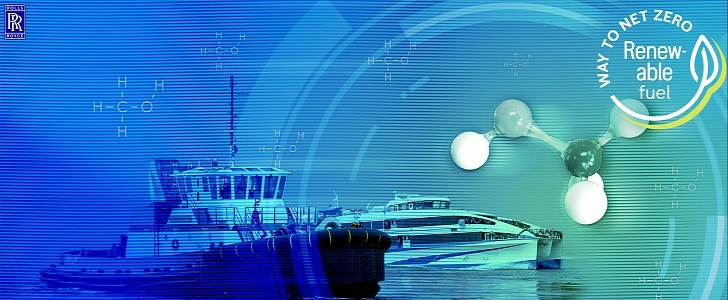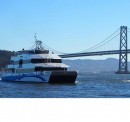E-Diesel, green hydrogen, fuel cell systems – these things seemed almost impossible to implement in the maritime industry not that long ago. Drastic changes in terms of zero-emission propulsion are harder to implement in this sector, but Rolls-Royce is one of the major players determined to make it happen.
Rolls-Royce announced that its most popular marine engines in production, the mtu Series 2000 and Series 4000, are officially compatible with sustainable fuels. This means that they can run on various alternatives to fossil fuels without requiring any modifications.
Starting next year, all kinds of vessels, from ferries to workboats and superyachts, will be able to operate with fewer emissions, without compromising performance. This was already confirmed by several companies in the U.S. that acted as pilot customers for the mtu engines.
The San Francisco-based Golden Gate Ferry has been testing the use of HVO (Hydrotreated Vegetable Oil/renewable diesel) with mtu engines since 2019. Six ferries carried out the tests, totaling more than 41,000 operating hours. The results showed that the mtu engines running on HVO had the same power, fuel consumption, and load acceptance.
HVO can be made from animal fats or used vegetable oil, cutting particulate emissions by up to 80% and nitrogen oxide emissions by 8%. Carbon emissions can be reduced by almost 90%, depending on the manufacturing process for the fuel.
Other types of fuels that are compatible with the mtu Series 2000 and Series 4000 are BtL (Biomass to Liquid) and PtL (Power to Liquid).
This is good news for operators in the maritime industry, who will have to comply with increasingly harsher environmental regulations set up by IMO (International Maritime Organization).
This milestone is just one of the steps that Rolls-Royce is taking for future green ships. It’s also working on methanol engines, fuel cell systems, and green hydrogen production. The goal is to cut 35% of greenhouse gas emissions by the end of the decade.
Starting next year, all kinds of vessels, from ferries to workboats and superyachts, will be able to operate with fewer emissions, without compromising performance. This was already confirmed by several companies in the U.S. that acted as pilot customers for the mtu engines.
The San Francisco-based Golden Gate Ferry has been testing the use of HVO (Hydrotreated Vegetable Oil/renewable diesel) with mtu engines since 2019. Six ferries carried out the tests, totaling more than 41,000 operating hours. The results showed that the mtu engines running on HVO had the same power, fuel consumption, and load acceptance.
HVO can be made from animal fats or used vegetable oil, cutting particulate emissions by up to 80% and nitrogen oxide emissions by 8%. Carbon emissions can be reduced by almost 90%, depending on the manufacturing process for the fuel.
Other types of fuels that are compatible with the mtu Series 2000 and Series 4000 are BtL (Biomass to Liquid) and PtL (Power to Liquid).
This is good news for operators in the maritime industry, who will have to comply with increasingly harsher environmental regulations set up by IMO (International Maritime Organization).
This milestone is just one of the steps that Rolls-Royce is taking for future green ships. It’s also working on methanol engines, fuel cell systems, and green hydrogen production. The goal is to cut 35% of greenhouse gas emissions by the end of the decade.






